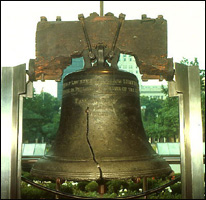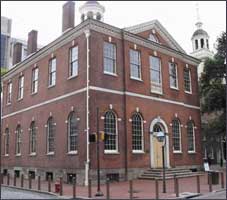IN THE 1776 PENNSYLVANIA CHRISTIAN CONSTITUTION, POWER WAS VESTED IN A 12-MAN
SUPREME EXECUTIVE COUNCIL WITH A PRESIDENT AND VICE PRESIDENT. THE LEGISLATURE WAS UNICAMERAL WITH NO SENATE. ELECTIONS FOR THE HOUSE OF RERESENTATIES WERE HELD YEARLY AND CONGRESSMEN WERE LIMITED TO 2-YEAR TERMS. SUPREME COURT JUDGES WERE LIMITED TO 7 YEARS IN OFFICE! THAT CHRISTIAN CHARTER OF LIBERTY WAS ABOLISHED IN 1790. |
Israel, or the New Jerusalem, was founded in Philadelphia, Pennsylvania, on July 4, 1776:
And to the angel of the congregation in PHILADELPHIA write; "these things saith he that is holy, he that is true, he that hath the key of David, he that openeth, and no man shutteth; and shutteth, and no man openeth. Him that overcometh will I make a pillar in the temple of Elohim, and he shall go no more out: and I will write upon him the name of Elohim, and the name of the city of Elohim, which is NEW JERUSALEM, which cometh down out of heaven from Elohim: and I will write upon him my new name" (Apocalypse 3:7-12).
Around 1500 BC, under the leadership of Joshua, the 12 tribes of Israel occupied the land of Canaan, but it was another 500 years before Jerusalem became their capital. Revived Israel was planted in the New World wilderness in 1620, but it was another 156 years before Philadelphia became their capital.
|
The Pennsylvanians who formulated the 1776 Constitution took Leviticus 25:10 very seriously.
The Supreme Executive Council of the Commonwealth of Pennsylvania was the collective directorial executive branch of the Pennsylvania state government.
It was headed by a President and a Vice President (later changed to a governor and lieutenant governor).
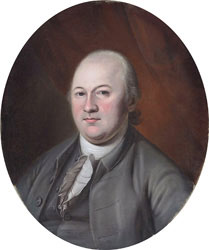 Thomas Wharton Jr. (1735–1778). First President of Pennsylvania. |
|
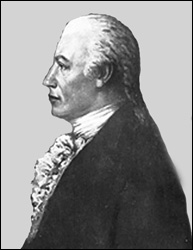 George Bryan (1731–1791). 2nd President of Pennsylvania. |
The democratic Constitution was supposed to be a blueprint for the other 12 states:
And each member, before he takes his seat, shall make and subscribe the following declaration, viz:
I do believe in one God, the creator and governor of the universe, the rewarder of the good and the punisher of the wicked. And I do acknowledge the Scriptures of the Old and New Testament to be given by Divine inspiration.
And no further or other religious test shall ever hereafter be required of any civil officer or magistrate in this State. (Section 10, 1776 Pennsylvania Constitution).
Almost every page of the New Testament or Covenant teaches salvation by FAITH ALONE. The word FAITH (Gk. pisteuo) occurs 244 times! Saint Paul—a Hebrew of the Hebrew—dogmatically declared:
For by grace you are saved through FAITH, and that not of yourselves, for it is the gift of God; not of works that no man may glory
(Lat. glorietur) (Ephesians 2:8, Douay-Rheims Version).
The real Revolution began in 1517 when Saint Martin Luther rediscovered and proclaimed the doctrine of salvation by Faith in Christ alone!
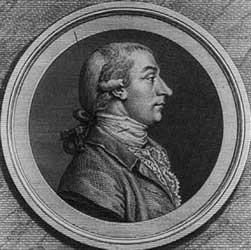 Joseph Reed (1741–1785). 3rd President of Pennsylvania. |
|
 William Moore (1735–1793). 4th President of Pennsylvania. |
Living in Philadelphia was very hazardous to your health after the Bill of Rights was added to Washington's "Constitution" in December 1791.
John Dickinson also served as the 5th President of Delaware but he was very circumspect about his religious views.

John Dickinson (1732–1803).
5th President of Pennsylvania. |
|
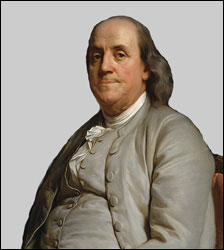 Benjamin Franklin (1706–1790). Benjamin Franklin (1706–1790).6th President of Pennsylvania. |
The Council of Trent condemns the cardinal doctrine of the blessed Reformation:
If anyone says that after the sinner is justified by faith alone, meaning that nothing else is required to cooperate in order to obtain the grace of justification, and that it is not in any way necessary that he be prepared and disposed by the action of his own will, let him be accursed (Council of Trent, Canon IX).
Here is a brief quote from the autobiography of Franklin:
I never doubted, for instance, the existence of the Deity; that he made the world, and governed it by his Providence; that the most acceptable service of God was the doing good to man; that our souls are immortal; and that all crime will be punished, and virtue rewarded, either here or hereafter. These I esteemed the essentials of every religion; and, being to be found in all the religions we had in our country, I respected them all, tho' with different degrees of respect, as I found them more or less mixed with other articles, which, without any tendency to inspire, promote, or confirm morality, served principally to divide us, and make us unfriendly to one another. (Franklin, Autobiography, p. 87).
In 1745, Franklin left Philadelphia for London. He spent 2 years in the British Empire capital city, and while there he entered the Order of the Friars of St. Francis of Wycome (Hellfire Club). Franklin wanted to remain a monk in Britain but he was told to go back to Philadelphia and covertly establish a branch of the Franciscans there!
The 1776 Christian Constitution was abolished in 1790
There was a perilous fight by the constitutionalists in Pennsylvania to retain the Christian Constitution.
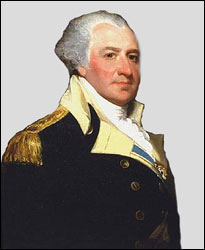 Thomas Mifflin (1744–1800). First governor of Pennsylvania. |
|
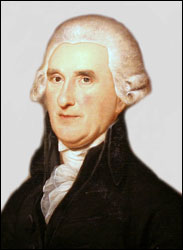 Thomas McKean (1734–1817). Second governor of Pennsylvania. |
That "Constitution" had absolutely no checks and balances because of the lack of the all-important term limits! The oath of office was also changed:
That no person, who acknowledges the person of a God and a future state of rewards and punishments, shall, on account of his sentiments, be disqualified to hold any office or place of profit or trust under this commonwealth (Article IX, Section IV, 1790 Pennsylvania "Constitution").
Even demons could swear to that because they believe in Elohim and tremble in anticipation of their soon coming doom in hell (Saint James 2:19). The new governor who supplanted the President could remain in office for 9 years:
The Governor shall hold his office during three years from the third Tuesday of December next ensuing his election, and shall not be capable of holding it longer than nine in any term of twelve years. (Article II, Section III. 1790 Pennsylvania "Constitution").
Another deadly addition was a SENATE with no term limits:
Delaware was actually an appendage of Pennsylvania and their original Constitution was similar. John Dickinson, Thomas Mifflin, and arch-intriguer Thomas McKean held offices in both states.The Senators shall be chosen, for four years, by the citizens of Philadelphia, and of the several counties, at the same time in the manner, and at the same places, where they shall vote for Representatives. (Article I, Section V, 1790 Pennsylvania "Constitution").
The office of President was also abolished in Delaware . . . but a Senate was added!
Pennsylvania was supposed to be a legislative "city on a hill" to give light to all the other states. Instead, that most democratic of Constitutions was abolished and replaced with a copy or twin of the New York State "Constitution."
 Joe Biden's 1965 University of Delaware photo. |
|
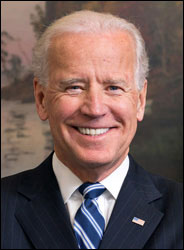 The official Professor Joe Biden photo. |
After the overthrow of the monarchy by Lucius Junius Brutus, Roma was ruled by 2 consuls who were elected for 1 year only.
Consuls were still answerable to the dictatorial Senate whose members served for life....Here is a quote from a history of the Roman Senate by a U.S. Senator who served from 1959 until his death in 2010:
Gaius Julius Caesar did not seize power in Rome. The Roman Senate thrust power on Caesar deliberately with forethought, with surrender, with intent to escape from responsibility. The Senate gave away power; the members—increased to 900 by Caesar—abandoned their duty as senators, and, in doing so, created in Caesar the most powerful man in the ancient world and one of the most powerful men in all history. (Byrd, The Senate in the Roman Republic, p. 259).
During the 1,229-year existence of the Roman Senate it was a completely pagan and anti-Christian organization. Very few U.S. Senators could subscribe to the 1776 Pennsylvania oath of office.
In 1777, Jesuit John Jay revived the pagan Roman senate in the New York State "Constitution." Soon all the other states copied the New York State bicameral legislature with the "upper house" consisting of senators. Having senators is bad enough, but permitting them to serve without term limits is double jeopardy. The ostensible reason for the bicameral legislature was to provide "checks and balances." The only checks and balances necessary are TERM LIMITS for every public official.
 The shrewd LAWYERS had the Emperor sign a decree that almost destroyed President Daniel. |
|
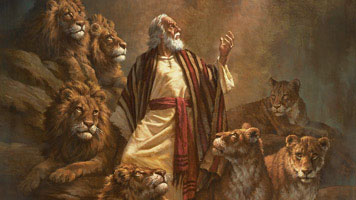 JEHOVAH sent his angel and closed JEHOVAH sent his angel and closed the mouths of the lions. |
The clever lawyers who changed the 1776 Christian Constitution are the spiritual heirs of the cunning lawyers who condemned President Daniel to the lions' den.
Saint Paul said that all the events in the Old Covenant or Testament were divinely ordained as a preview of events that would come to pass before Armageddon and the end of time:
Now all these things happened to them as examples, and they were written for our admonition, upon whom the ends of the world have come (I Corinthians 10:11).
The Messiah wants the New Jerusalem to have Great FAITH . . . so fulfilled prophecy is a great FAITH BOOSTER:
And now I have told you before it comes to pass, that, when it comes to pass, ye might believe (Saint John 14:29).
Vital links
References
Brunhouse, Robert L. The Counter-Revolution in Pennsylvania, 1776–1790. Pennsylvania Historical and Museum Commission, Harrisburg, PA, 1971.
Byrd, Robert C. The Senate of the Roman Republic: Addresses on the Roman Constitutionalism. Barakaldo Books, Chicago, Illinois. (Byrd was U.S. Senator for 51 years).
Franklin, Benjamin. Autobiography. Pocket Books, New York, 1954.
Isaacson, Walter. Benjamin Franklin: An American Life. Simon & Schuster, New York, 2003.
McKean, David. Suspected of Independence: The Life of Thomas McKean. America's First Power Broker. PublicAffairs, New York, 2016.
Schroeder, Rev. H.J. The Canons and Decrees of the Council of Trent. Tan Books, Charlotte, North Carolina, 1978.
Selsam J. Paul. The Pennsylvania Constitution of 1776: A Study in Revolutionary Democracy. Octagon Books, New York, 1971.
Copyright © 2022 by Patrick Scrivener
